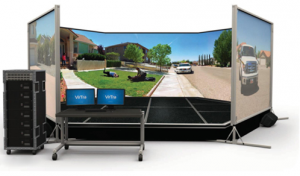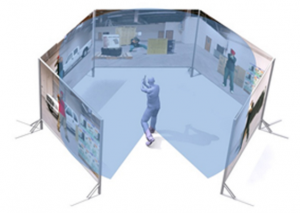
Today’s police officers face a wide variety of situations that often are difficult to anticipate, much less properly prepare for. A new virtual training module used by Provo Police simulates these scenarios, training officers for the unexpected.
The new virtual simulator, called The VirTra 300, simulates high-intensity situations police officers may encounter, giving officers an opportunity to practice the appropriate response before potentially facing them while on duty.
Provo Police Sgt. Joseph Otte said the new equipment is used to simulate a variety of encounters, ranging from handling individuals who are suicidal or have mental health issues to managing active shooters in a building.
The VirTra 300 reinforces de-escalation, a term used to describe the diffusion of high intensity situations without the use of force whenever possible. Because the use of the simulator is new to Provo, success at this point is difficult to measure. However, Otte believes it will help develop officers’ ability to make decisions quickly and efficiently.
“We want guys thinking on their feet when they don’t have a lot of time to study situations,” Sergeant Otte said. “When officers repeat patterns in practice, they then repeat these patterns in real performance.”
While the equipment may be new to Provo, Ken Wallentine, special agent of the Utah Attorney General’s Office, has been running the virtual machine within his office for years. He believes the simulator increases the police officers’ confidence in themselves as well as the public’s confidence in the officers.
“(When) you provide robust, realistic, repetitive performance in virtual reality, that is then facilitated by a trained and skilled instructor, (it) gives the officer a better pattern of performance out on the street,” Wallentine said. He believes this facilitates better communication, decision-making, execution and outcomes, which ultimately lead to a safer community.

The simulator uses screens assembled in a 300 degree semi-circle to allow officers to feel as if the situation is real. Not only is the simulator itself realistic, but the scenarios are based on real police encounters. These officers also take their exact firearms into the simulation.
The VirTra 300 uses an immersive surround system similar to that of an IMAX theater. If a suspect shoots an officer during the simulation, the officer hears and sees the concussion of the gun and feels an electrical shock to simulate being shot.
These situations allow officers to repetitively practice during high-intensity situations so their behavior becomes automatic when applied on the street. Wallentine refers to this as “stress inoculation.”
“Teaching officers in stressful situations rather than calm situations, we actually prepare them to be in their right mind to execute trained responses,” Wallentine said. He believes the simulator actually decreases the stress levels of officers on the street by lowering heart rate and other forms of physiological stress, leaving the officers feeling more calm.
According to Wallentine, one of the most important features of the virtual simulator is that it uses a holistic approach to training police officers. Rather than simply evaluating an officer’s performance with the use of a weapon, it also evaluates their interpersonal communication skills, which can be just as crucial on the job.
Not all police programs have adopted the use of a virtual simulator similar to the VirTra 300. The Utah Peace Officers Standard and Training, or POST Academy, uses virtual simulators for emergency vehicle operation but has yet to adopt virtual reality in training its officers for day to day activities.
According to Wade Breur, a training lieutenant officer at POST Academy, the VirTra 300 simulator is just that — a simulator. The simulators don’t allow officers to move around, which can be a possible limitation in its implementation.
“You just can’t replace live role-play scenario training,” Breur said.
However, Breur recognizes the benefit of such training for the Provo Police and Utah Attorney General Office because it allows officers to practice focused decision-making.
Moving forward, Breur doesn’t anticipate implementing more virtual simulators in the POST Academy training, largely because of funding. The devices can be extremely costly and implementing them would affect all of POST’s satellite training facilities.
Provo Police will continue to move forward using the virtual simulator training and are optimistic about the benefits it will bring to the community.




